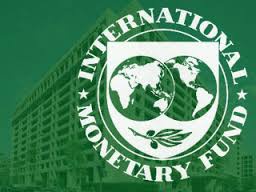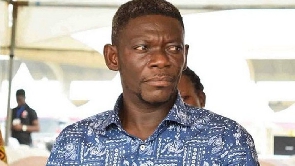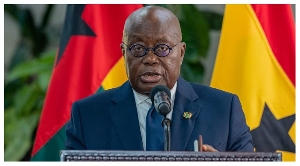- Home - News
- TWI News | TV
- Polls
- Year In Review
- News Archive
- Crime & Punishment
- Politics
- Regional
- Editorial
- Health
- Ghanaians Abroad
- Tabloid
- Africa
- Religion
- Election 2020
- Coronavirus
- News Videos | TV
- Photo Archives
- News Headlines
- Press Release
General News of Wednesday, 22 August 2001
Source: Public Agenda
Finance Minsiter Plays Catch-Up With IMF

...What We Were Not Told
Finance Minister, Yaw Osafo Maafo, last Wednesday told the media that he is playing 'the headmaster' in checking government expenditure in Ministries, Departments and Agencies (MDAs) to ensure strict compliance to laid down fiscal policies.
What he did not tell his audience was that the International Monetary Fund (IMF) was playing headmaster on him. The IMF has adopted an even stricter supervisory approach in ensuring that the Kufuor administration complies with the Prior Actions, Structural Performance Criteria and Benchmarks set for Ghana as a condition for continuous support from the fund to this country.
Key aspects of these conditions include increases in a number of user fees, licenses and other charges that have not kept pace with inflation in recent years. For user fees, Ghanaians will be looking at education and the 'cash-and-carry' system at the hospitals.
The IMF is encouraging the Government to keep open the option of raising the general VAT rate next year. If this goes through, the IMF is advising that the Government should avoid the policy of further earmarking the resultant revenues to be accrued from the VAT for particular expenditures.
This is in apparent reference to 2.5 percent increase in the VAT rate last year, which was made available for the Education Trust Fund.
The government however rejected any preposition for an increase in the VAT rate. It says any attempt to achieve a larger surplus in tax revenue through an increase in VAT rate would risk a political backlash following so closely on the increase in petroleum and utility tariffs.
The Government of Ghana is also required to impose a 15 percent excise duty and specific duties averaging ?200 per litre on petroleum products with effect from September 1, 2001, to recover petroleum taxation removed in the February 2001 price increase.
The Structural Performance Criteria demands completion of an audit at the MDA level of the full stock of payment arrears accrued since January 1, 2000, and adoption of a strategy for their liquidation by the end of August 2001.
Under the Structural Benchmarks condition, government is to terminate the direct sale of foreign exchange to Tema Oil Refinery (TOR) or any other company from November 1, 2001, and this should be completed by December 2001.
There shall also be divestiture by the Central Bank's shareholdings in all financial institutions under its supervision, latest by December, 2001.
A fourth review of IMF programs in Ghana under the Poverty Reduction and Growth Facility (PRGF) is expected to be completed by December 15, 2001. This review will focus on (a) progress on restoring the financial viability of TOR and the major public utilities; (b) progress in developing a privatization strategy for Electricity Company of Ghana (ECG) and Ghana Commercial Bank (GCB); and (c) implementation of the strengthened public expenditure monitoring and control system.
Against the background of all these stringent requirements, government was running against time to qualify for the fifth disbursement of a Special Drawing Right (SDR) 228.8 million which is validated till May 3, 2002.
In a letter dated June 11, 2001, jointly signed by Osafo Maafo and Emmanuel Asiedu-Mante (as the Acting Governor of the Bank of Ghana) and addressed to Horst Kohler, Managing Director of the IMF, the Government pleaded for waivers for the non-observance of the quantitative performance criterion on the net domestic financing of the government, scheduled to have ended in August 2000.
The waiver was also to cover the structural performance criterion on the appointment of a sales advisor for the divestiture of the ECG, which was to have been met by the end of September 2000.










